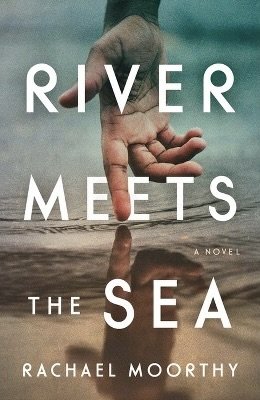From issue 2.8 October 2023 of Girls to the Front!
A mini-review and “Why I Wrote This” for Rachael Moorthy’s River Meets the Sea
River Meets the Sea is the epic tale of two men, Ronny and Chandra, whom we meet in their respective childhoods and follow throughout the course of their wild and colourful, and somewhat tragic lives. Ronny’s story begins in 1946, near the Stó:lō river in qiqét, New Westminster, BC (the river). He’s a foster child who doesn’t even know the names or ancestry of his parents. His home life is rotten but he’s uplifted by his friends and Ray, an Indigenous fisher who feeds him bannock and tells him stories. Chandra’s story begins in 1977 in Snuneymuxw, Nanaimo, BC (the sea). Chandra was born on the merchant ship his parents arrived to Canada on, from Sri Lanka and even though he is with his parents, he too feels unsure of what sort of category he falls into in terms of his race or ancestry. Both boys have “water blood” and a “movie theatre in [their] head[s].” They seek refuge immersed in water and their imaginations. Throughout this novel, we follow Ronny as he discovers jive dancing in Hogan’s Alley, joins the navy, marries and has a child, and Chandra as he discovers a love for swimming, theatre and one special girl. This book covers a lot of ground, but it does so as a fast-paced whirlwind for the senses. Moorthy’s writing is rich, descriptive and full of acrobatic language. Throughout, she touches on the tragic distance between kids and the adults meant to guide them, as well as on themes of belonging and race in that these two characters straddle two or more worlds, unsure of where they should or do land. Moorthy also interrogates colonialism, not only in Canada, but worldwide—how it has shaped us, what it has stolen. This is a truly ambitious and impressive debut.
Why I Wrote River Meets the Sea
by Rachael Moorthy
River Meets the Sea is a love letter to the element of water (Stó꞉lō) first, a historical fiction novel that grapples with the complexity of “Canadian” identity second, but you could also read the book as a 400-page long answer to the question "where are you from?" Growing up as an avid reader, I craved representation for the aporetic space that I occupy as a mixed person, and so I took Toni Morrison's advice and wrote the book I wanted to read. River Meets the Sea is for everyone; however, I definitely wrote with a specific audience in mind: descendants of orphans and foster kids, Black-coded diasporic people, displaced Indigenous people, and those who, like myself, are woven from the loose threads of all of the above.
A significant part of the novel takes place in and around what is now known as Vancouver (i.e., Hogan's Alley before the viaduct), and on Vancouver Island. The heart of the novel is thematically relevant to current dialogues taking place on Turtle Island because it offers an alternative to the systems in place which perpetuate and reward phenomenons like Pretendianism and tokenism in lieu. Challenging/complex/nuanced perspectives on race are desperately needed if we genuinely want to eliminate the prejudice and racism that is embedded in our social fabric. I also wanted to interrogate Hegemonic Western masculinity, and to show how the power of art, community, and tapping into the divinity of the natural world can help break intergenerational cycles. I am deeply drawn to worldly adventure, escapism, and dynamic plots, too, so I packed a lot of adventure in there as well, much of it inspired by my grandfather’s experiences as a diver in the navy (my favourite part to write was Ronny's nautical escapades and Chandra's surfing/forest bathing/open water swimming scenes). So, yeah, it’s an ambitious debut with a lot of big themes, but I think I pulled it off.
Rachael Moorthy’s prose and poetry has appeared in PRISM International, SAD Magazine, and This Side of West and she was short-listed for The Malahat Review’s 2020 Far Horizons Award for Poetry. She has a Bachelor of Arts degree in creative writing from UVic and is pursuing a Master’s degree in literary studies from the University of Basel.


